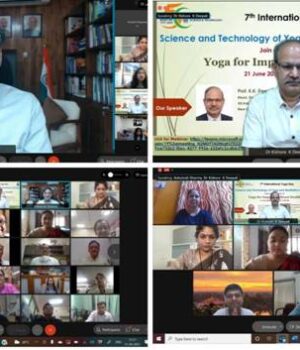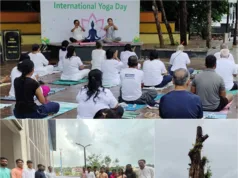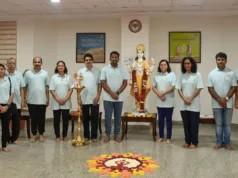PANAJI: The importance of ‘Yoga for Improving Heart Health’ was highlighted at a webinar organised on the occasion of International Yoga Day today, says a press release by the Ministry of Science & Technology.
“There is a connection between health, mind, heart and yoga & meditation can greatly help us in living a healthy and balanced life,” pointed out secretary of Department of Science and Technology (DST), Professor Ashutosh Sharma, at the webinar organised by DST under Science and Technology of Yoga and Meditation (SATYAM).
Prof Sharma explained the meaning of Yoga and its role in human wellbeing and elaborated on the efforts of DST in this direction through SATYAM. He emphasised that it is important to understand the science behind Yoga for long-term mental and physical well-being and said that now the time has come when along with science, technology should be added in yoga and meditation.
Prof KK Deepak from the All India Institute of Medical Sciences, New Delhi outlined the ways in which varied heart diseases and conditions can be addressed holistically through yoga, in his lecture. Yoga practice provides individuals with better resilience, adaptive capacity and adaptability to various conditions of the heart. They are better adapted to the challenges imposed on nervous system. Available scientific evidence suggests that the practice of slow breathing makes us better adapted to challenges and crisis related to movement or flow of blood. Yoga is useful for reducing inflammation, stress and hypoxia (insufficient oxygen supply to the cells and tissues). Yoga reduces susceptibility to heart rhythm problems.
Head, WISE-KIRAN Division, (DST) Dr Nisha Mendiratta also mentioned that considering the importance of yoga, DST initiated a specialised programme ‘Science and Technology of Yoga and Meditation (SATYAM)’. She emphasised that SATYAM is aimed to investigate the effect of Yoga and Meditation on physical and mental health and wellbeing as well as on the body, brain, and mind in terms of basic processes and mechanisms. She also stated that more than 100 projects have been supported under SATYAM and around 40 research papers have been published in peer reviewed journals. More than 70 institutions are associated with SATYAM programme.
Research supported under this programme cover various diseases like lifestyle diseases (stroke, obesity, heart disease and type-2 diabetes), arthritis, lower back pain, kidney related disease, cancer, COPD, women health (PCOS, infertility, pregnancy related problems, menopause) and so on. Studies funded under this programme have shown that Yoga results in significant improvement in diseases like schizophrenia, epilepsy, dementia, mild cognitive impairment, sleep, autism spectrum disorder, Parkinson’s disease, multiple sclerosis, and also in tackling social issues like anxiety, dépression, suicidal tendencies, dependence on alcohol & opioid, excessive use of internet and so on. Based on the positive results many investigators have suggested yoga as add on therapy in clinical practice. A special call has also been announced under SATYAM to explore the effectiveness of Yoga in combating COVID-19.
Further, around 10,000 girl students of Class IX-XII enrolled under Vigyan Jyoti Program of DST took part in a Yoga session under the guidance of Yoga Expert, Dr Arundhati Ray, Assistant Professor, S-VYASA, Bangalore. Officials of Department of Science and Technology also participated in the Yoga session. Dignitaries from different parts of the world participated online in a month long ‘International YOGACON 2021’ supported by DST under the SATYAM programme.
DST’s celebration of the International Yoga Day with multiple activities can help popularise a scientific approach to Yoga among people.






